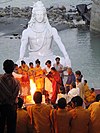印度佛法
閱讀設定
印度佛法(粵拼:jan3 dou6 faat6 fat3),音譯做達嘛(梵文:धर्म,dharma,巴利文:धम्म,dhamma)係喺印度嘅哲學同埋宗教上面好極緊要嘅術語。
攷
[編輯]- ↑ Gavin Flood (1994), Hinduism, in Jean Holm, John Bowker (Editors) – Rites of Passages, ISBN 1-85567-102-6, Chapter 3; Quote – "Rites of passage are dharma in action."; "Rites of passage, a category of rituals,..."
- ↑ see:
- David Frawley (2009), Yoga and Ayurveda: Self-Healing and Self-Realization, ISBN 978-0-9149-5581-8; Quote – "Yoga is a dharmic approach to the spiritual life...";
- Mark Harvey (1986), The Secular as Sacred?, Modern Asian Studies, 20(2), pp. 321–331.
- ↑ see below:
- J. A. B. van Buitenen (1957), "Dharma and Moksa", Philosophy East and West, 7(1/2), pp. 33–40;
- James Fitzgerald (2004), "Dharma and its Translation in the Mahābhārata", Journal of Indian philosophy, 32(5), pp. 671–685; Quote – "virtues enter the general topic of dharma as 'common, or general, dharma', ..."
- ↑ Bernard S. Jackson (1975), "From dharma to law", The American Journal of Comparative Law, Vol. 23, No. 3 (Summer, 1975), pp. 490–512.
- ↑ Harold Coward (2004), "Hindu bioethics for the twenty-first century", JAMA: The Journal of the American Medical Association, 291(22), pp. 2759–2760; Quote – "Hindu stages of life approach (ashrama dharma)..."
- ↑ see:
- Austin Creel (1975), "The Reexamination of Dharma in Hindu Ethics", Philosophy East and West, 25(2), pp. 161–173; Quote – "Dharma pointed to duty, and specified duties..";
- Gisela Trommsdorff (2012), Development of "agentic" regulation in cultural context: the role of self and world views, Child Development Perspectives, 6(1), pp. 19–26.; Quote – "Neglect of one's duties (dharma – sacred duties toward oneself, the family, the community, and humanity) is seen as an indicator of immaturity."






